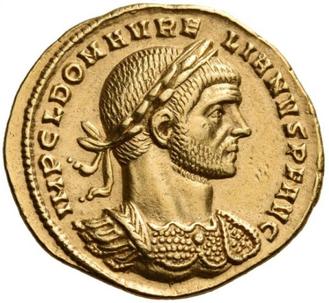
As an Empire crumbled, a soldier takes the lead to stop its fall.
But after it is brought back to its former glory, he is killed.
Story in the evening ...
But after it is brought back to its former glory, he is killed.
Story in the evening ...
https://twitter.com/Arby_K/status/1435067886440046595
Lucius Domitius Aurelianus was born around 215, during a period of instability for the Roman Empire. The Emperor was killed in 217 and his praetorian prefect became Emperor instead. But in 218, the new Emperor was killed and a relative of the earlier Emperor made Emperor. 1/10 

Aurelianus may have joined the Roman army in 235. The same year, Emperor Marcus Aurelius Severus Alexander was killed by his own troops ending the Severan dynasty that ruled for most part since 193. The next 50 years saw 26 Roman Emperors come and go in quick succession. 2/10 

But the low came in 260, when the Persians of Shahanshah Shapur defeated the Romans at Edessa and captured (and later killed) Emperor Publius Licinius Valerianus. Aurelianus is likely to have been in the cavalry of his son and successor, Publius Licinius Egnatius Gallienus. 3/10 

The defeat led to breakaway kingdoms in west by Marcus Cassianus Latinius Postumus and in east by Septimius Odaenathus. Though Gallienus brought relative stability to the Empire he controlled, he was killed in 268, in a conspiracy in which Aurelianus may have been involved. 4/10 



Aurelianus became the commander of cavalry under the new Emperor, and later his army chief. Romans also had to deal with Germanic tribes that broke through their northern defences. Emperor Claudius and Aurelianus defeated the Alemanni at Lake Benacus, in Italy. 5/10 

Emperor Claudius and Aurelianus then headed for Anatolia to deal with the Goths. But the Emperor died during the war campaign. His brother, Quintillus, was acclaimed as Emperor by the Senate in Rome, while Aurelianus was acclaimed as Emperor by the troops. 6/10 

By the end of 270 though, Aurelianus was the lone Emperor. He first had to deal with the Germanic tribes - Vandals were stopped in Pannonia, and Alemanni (again) and Juthungi in Placentia and Fano, in Italy in 271. He also bolstered Rome's defence with the Aurelian Walls. 7/10 



He also had to deal with imperial challengers as well. But by 271, he had enough control over the Empire to focus on the breakaway regions. The first was the Palmyrene Empire in the east ruled by Empress Zenobia. After victory at Immae and Emesa, Aurelianus secured the east. 8/10 



Next he headed west to conquer the Gallic Empire. Aurelianus defeated the Gallic forces at Châlons and induced their Emperor Tetricus to change sides. The Roman Empire was finally restored though it let go off Dacia, which was north of the Danube river and difficult to hold. 9/10 

Aurelianus wasn't done though. He then set off for Persia, but was killed by some of his soldiers in a "misunderstanding". Though the next decade saw six more Emperors, the Empire held and in 284, Diocles became Emperor and steadied the ship ruling till 305. 10/10 

• • •
Missing some Tweet in this thread? You can try to
force a refresh















